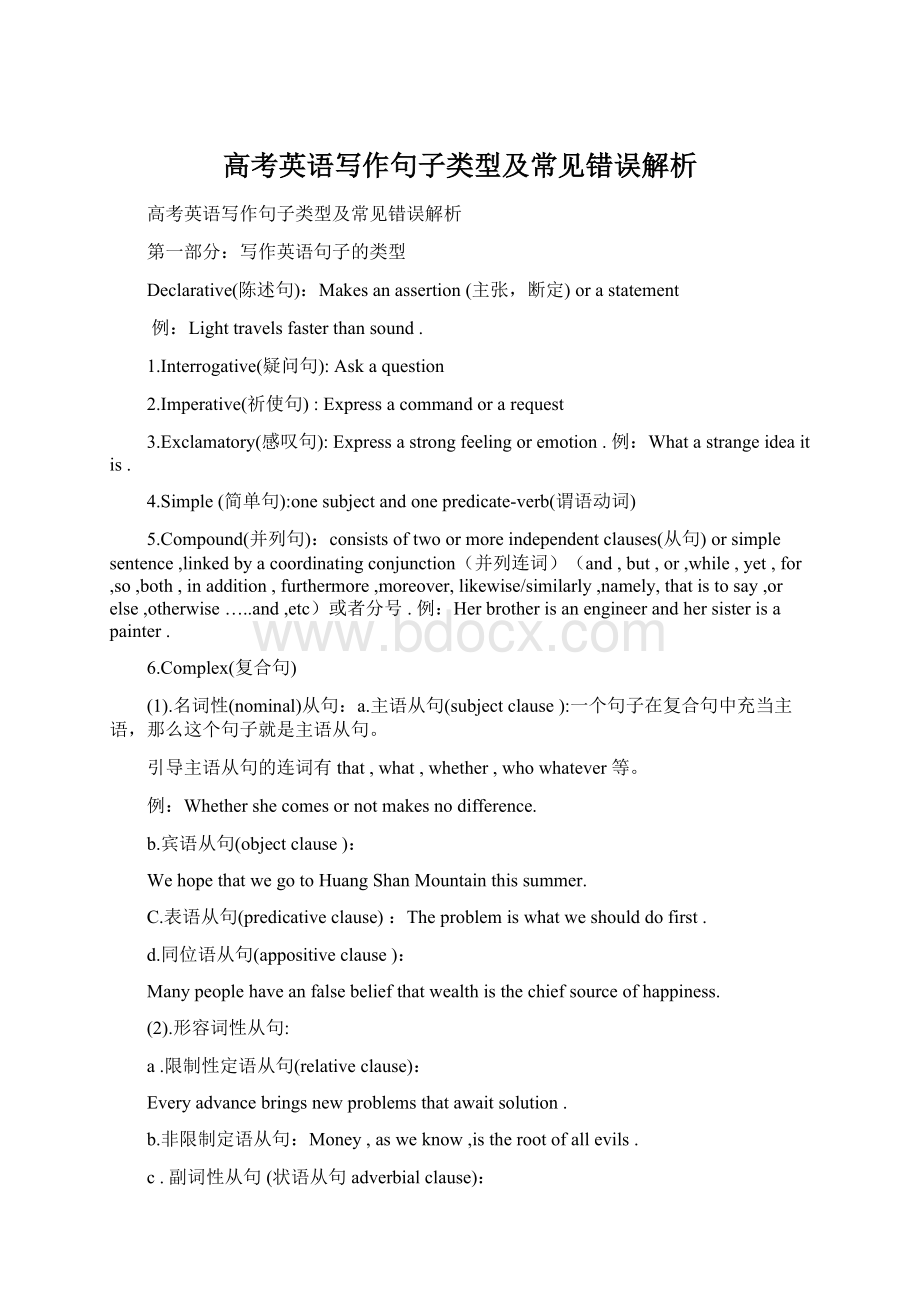高考英语写作句子类型及常见错误解析.docx
《高考英语写作句子类型及常见错误解析.docx》由会员分享,可在线阅读,更多相关《高考英语写作句子类型及常见错误解析.docx(15页珍藏版)》请在冰豆网上搜索。

高考英语写作句子类型及常见错误解析
高考英语写作句子类型及常见错误解析
第一部分:
写作英语句子的类型
Declarative(陈述句):
Makesanassertion(主张,断定)orastatement
例:
Lighttravelsfasterthansound.
1.Interrogative(疑问句):
Askaquestion
2.Imperative(祈使句):
Expressacommandorarequest
3.Exclamatory(感叹句):
Expressastrongfeelingoremotion.例:
Whatastrangeideaitis.
4.Simple(简单句):
onesubjectandonepredicate-verb(谓语动词)
5.Compound(并列句):
consistsoftwoormoreindependentclauses(从句)orsimplesentence,linkedbyacoordinatingconjunction(并列连词)(and,but,or,while,yet,for,so,both,inaddition,furthermore,moreover,likewise/similarly,namely,thatistosay,orelse,otherwise…..and,etc)或者分号.例:
Herbrotherisanengineerandhersisterisapainter.
6.Complex(复合句)
(1).名词性(nominal)从句:
a.主语从句(subjectclause):
一个句子在复合句中充当主语,那么这个句子就是主语从句。
引导主语从句的连词有that,what,whether,whowhatever等。
例:
Whethershecomesornotmakesnodifference.
b.宾语从句(objectclause):
WehopethatwegotoHuangShanMountainthissummer.
C.表语从句(predicativeclause):
Theproblemiswhatweshoulddofirst.
d.同位语从句(appositiveclause):
Manypeoplehaveanfalsebeliefthatwealthisthechiefsourceofhappiness.
(2).形容词性从句:
a.限制性定语从句(relativeclause):
Everyadvancebringsnewproblemsthatawaitsolution.
b.非限制定语从句:
Money,asweknow,istherootofallevils.
c.副词性从句(状语从句adverbialclause):
1)时间状语从句:
ItrainseachtimeIarriveatShanghai.
2)地点状语从句:
Wherebeesare,thereishoney.
3)条件状语从句:
Ifyouworkhard,youwillachieveyourambition.
4)目的状语从句:
Sheexercisesdailysothatshecanloseweight.
5)原因状语从句:
Youngasshewas,shewasunabletodothejobwell.
6)结果状语从句:
Theytalkedloudly,sothateveryoneheardwhatwassaid.
7)让步状语从句:
AlthoughIunderstandwhatyousay,Icannotagreewithyou.
8)比较状语从句:
Themorehethankedme,thelesspleasedIfelt.
9)方式状语从句:
Youhavetofillintheformasyouhavebeeninstructed.
7.Compound-Complex(并列复合句):
一个或多个从句,两个主句
8.Loose(松散句):
主句在前,从句在后.例:
Shemissedthestepandsprainedherankle.
9.Periodic(尾重句,掉尾句):
从句在前,主句在后.例:
Itisapleasuretoreadgoodbooks.
Badlyfrightenedbytheexplosion,theboyrushedoutofthelaboratory.
Icouldtellthathewasdisappointedbythetoneofhisvoiceandthelookonhisface.
10.BalancedSentences(平衡句)例:
ItwillnotbedonebytheGovernment;itcannotbedonebyParliament.Artislong,butlifeisshort.Icame,Isaw,Iconquered.Manproposes,Goddisposes.
11.插入句型(插入语:
parenthesis)
(1)副词类:
Finally,theenvironmentiscleanandcomfortable.(列举)Moreover,weshouldwidenthepublicunderstandingofeducation.(递进)
Briefly,healthismoreimportantthanwealth.(结论)
Really,wecannotaffordtowaitforthemtochangetheirminds.(强调)
Naturally,thechildrenarebehavingwellwhileyouarehere.(事实)
Hence(因此),parentsshouldgivechildrenenoughfreedomtodevelop.(结果)
Personally,Ithinkpeoplewhodriveshouldnotdrink.(推理)
Youcannothaveacakeandeatit;likewise/similarly,youcannotidleawayyourtimeandscorehighonthefinalexamination.(比较)
Otherpeople,however,thinkdifferently.(对照)
12.否定句型(nothing,nothingbut,not,itgoeswithoutsayingthat,farfrom,unable,beyond,hardly,little,neithernor,outofthequestion,havenoalternativebutto,withoutexception,bynomeans,innoway).例:
Nothingimproveswritingbutwriting.Noteverydictionaryisvaluable.Theharvestsin1848wasfarfromnormal.Icannotagreewithhimmore.Youcanhardlyimaginehowdifficultthetaskis.Nooneisdenyingnowthatsmokingisagreatdangertohealth.
13.倒装句(inverted)(Nosoonerthan,Hardlywhen)例:
Onlyinthiswaycanwepasstheexam.
14.对比句型:
notsomuchAasB(与其说A倒不如说B)例:
ItwasnotsomuchhisappearanceIlikedashispersonality.Anomore…thanB(A和B一样也不)Amancannomoreflythanabirdcanspeak.Anoless…thanB(A和B一样都)nomorethan(仅仅,至多)notmorethan(不多于,不超过)Theinterviewlastednomorethanfiveminutes.nolessthan(多达,至少,简直是)notlessthan(不少于,超过)moreAthanB(与其说B倒不如说A)incomparisonwith(和….比起来)incontrastwith(和…..相反,与…形成对比)
15.描述句型:
例:
Yoursuitcaseisalmostfourtimesasheavyasmine.
16.被动句型:
(passivesentence)Gooduseshouldbemadeofyourtime.
17.虚拟(subjectmood):
Iftherewerenoair,alllivingthingswoulddie.Butfortherain,weshouldhavehadapleasantjourney.
18.独立结构句型:
(independentstructure)Therebeingnotrain,wehadtowaittillthenextday.
第二部分:
写错英语句子的类型
一、母语干扰型
许多同学在进行英语写作时,很容易受汉语的影响而写错句子,即写出所谓的Chinlish。
这是最常见的错误之一。
如:
1.事实上,这个人年纪很轻。
误:
Infact,theman’sageisveryyoung.
正:
Infact,themanisveryyoung.
析:
中国人常说“年纪轻”,但英语中的young本身就有“年纪轻”的意思,它习惯上不再与age搭配使用。
类似地,汉语说“他年纪很大”,不能译成Hisageisveryold,而应是Heisveryold.
2.我的工作太忙,我不能来。
误:
MyworkistoobusyandIcan’tcome.
正:
I’mtoobusyandIcan’tcome.
析:
汉语说“工作忙”,实际上是指“人忙”。
类似地,要表达汉语中的“我的事情很忙”,英语只需说I’mbusy就够了,而不能说成Mythingsarebusy.
3.这个老太太的左眼瞎了。
误:
Theoldwoman’slefteyeisblind.
正:
Theoldwomanisblindinthelefteye.
析:
汉语中说“眼瞎”,而按英语习惯却要说“人瞎”,瞎在哪儿?
瞎在“眼睛”,所以英语中要表达类似意思总是用“人”作主语,而用介词短语引出“瞎”的位置。
同样地,要表示“他的左腿是跛的”,不能说成Hisleftlegislame,而应说成Heislameinhisleftleg.
4.他身体很好,很少生病。
误:
Hisbodyisgood/healthy,andseldomfallsill.
正:
He’shealthy,andseldomfallsill.
析:
汉语说“身体好”,其实是指某人的健康处于一种良好的状态,而绝不是指他的躯体是完好的。
5.我讨厌周末拥挤的交通。
误:
Ihatethecrowdedtrafficonweekends.
正:
Ihatethebusy/heavytrafficonweekends.
析:
汉语可说“拥挤的交通、街道、房间、商店等”,而英语中虽然可说crowdedstreets/rooms,shops等,但习惯上不说crowdedtraffic。
6.汤姆打了鲍勃的脸。
误:
TomhitBob’sface.
正:
TomhitBobintheface.
析:
汉语中可以说“打某人的脸”,而英语中必须先说“打某人”再+介词+the+身体的某个部位。
又如“打某人的鼻子”译为hitsb.onthenose.“抓住某人的胳膊”译为catchsb.bythearm.
二、成分残缺型
许多同学在进行英语写作时,通常不考虑句子的完整性而写出一些成分残缺的句子。
如:
1.他的笔头英语不错,但口语不行。
误:
HiswrittenEnglishisgood,butnotgoodatspokenEnglish.
正:
HiswrittenEnglishisgood,buthisspokenEnglishisnotgood.
正:
HeisgoodatwrittenEnglish,butnotgoodatspokenEnglish.
析:
误句中but后的句子缺适当的主语,因为goodatspokenEnglish的主语应是“他”,而不是hiswrittenEnglish。
2.英语很有趣,我的确很喜欢。
误:
Englishisveryinteresting,andIreallylikeverymuch.
正:
Englishisveryinteresting,andIreallylikeitverymuch.
析:
like是及物动词,其后通常应有宾语。
3.别怕,我们会帮你的。
误:
Don’tafraid;we’llhelpyou.
正:
Don’tbeafraid;we’llhelpyou.
析:
误句谓语不完整,因为afraid是形容词,不是动词,不能单独作谓语,必须和连系动词一起构成谓语。
当然,若说成Don’tfear,则完全可以。
4.住在我隔壁的李明是个医生。
误:
LiMing,livesnexttome,isadoctor.
正:
LiMing,wholivesnexttome,isadoctor.
正:
LiMing,livingnexttome,isadoctor.
析:
误句中定语成分不完整。
定语从句是一个完整的句子,当先行词指人且关系代词在从句中作主语时要用that或who。
也可用现在分词短语作后置定语。
5.你介意我问你一个问题吗?
误:
DoyoumindIaskyouaquestion?
正:
DoyoumindifIaskyouaquestion?
正:
Doyoumindmyaskingyouaquestion?
析:
误句中的主句和从句之间缺少连接词。
也可以用动名词短语作mind的宾语。
6.他考试及格了使他妈妈很高兴。
误:
Hepassedtheexammadehismotherveryhappy.
正:
Thathepassedtheexammadehismotherveryhappy.
正:
Hepassedtheexam,whichmadehismotherveryhappy.
析:
误句中的主语应该是由主语从句来承担的。
that引导主语从句,不做成分,无实际意义,但不能省略。
也可以用非限定性定语从句。
三、想当然型
有的同学在写作时,常将一些似是而非的东西想当然乱用,不注意语言的准确性和地道性。
如:
1.我说两个小时的时候,那是包括了吃饭的时间。
误:
WhenIsaytwohours,whichincludesthetimeforeating.
正:
WhenIsaytwohours,thatincludesthetimeforeating.
析:
许多同学往往想当然地认为在逗号后面总是用which引导定语从句,而不用that。
其实,本句中的thatincludesthetimeforeating不是定语从句,而是主句(that用作主句主语),其前的whenIsaytwohours为状语从句。
2.你应该更注意练习你的英语口语。
误:
YoushouldpaymoreattentiontopractiseyourspokenEnglish.
正:
YoushouldpaymoreattentiontopractisingyourspokenEnglish.
析:
有的同学们认为to后总是接动词原形,构成不定式。
其实,此句中的to不是不定式符号,而是介词,所以其后的动词要用原形。
3.几年前,对大多数中国人来说,在家里有一台电脑的想法还是不大现实的。
误:
Justafewyearsago,theideatohaveacomputerinone'shomeseemedverydifficultformostChinese.
正:
Justafewyearsago,theideaofhavingacomputerinone'shomeseemedverydifficultformostChinese.
析:
许多同学认为表示做某事就用动词不定式,这要根据具体情况来定。
idea后面要用of短语说明idea的内容。
4.尽管他只有十六岁,但是他已经学会用英语和外国人交谈了。
误:
Althoughheisaboyofsixteen,buthehaslearnedtotalkwiththeforeignersinEnglish.
正:
Althoughheisaboyofsixteen,hehaslearnedtotalkwiththeforeignersinEnglish.
正:
Heisaboyofsixteen,buthehaslearnedtotalkwiththeforeignersinEnglish.
析:
许多同学往往认为“虽然…但是”是关联词组。
但although是从属连词,而but为并列连词,故不能同时出现在同一句中。
类似的还有because和so,也不能连用。
5.他迟到的原因是因为他没赶上早班车。
误:
Thereasonwhyhewaslateisbecausehedidn’tcatchtheearlybus.
正:
Thereasonwhyhewaslateisthathedidn’tcatchtheearlybus.
析:
许多同学认为“因为”表原因就用because,但在此句Thereasonwhy…isthat中that引导表语从句,无实际意义。
6.他说他将尽最大努力学好英语。
误:
HesaidhewoulddowhathecouldlearnEnglishwell.
正:
HesaidhewoulddowhathecouldtolearnEnglishwell.
正:
Hesaidhewoulddo/tryhisbesttolearnEnglishwell.
析:
情态动词后只能跟动词原形。
于是有的同学就出现了误句。
实际上,此句中“学好英语”是“尽最大努力”的目的状语,应该用不定式。
四、思维定势型
有的同学不能灵活地运用所学知识进行表达,而是凭印象观念,结果写错句子。
1.我永远不会忘记我们一起度过的日子。
误:
I’llneverforgetthedayswhenwespenttogether.
正:
I’llneverforgetthedayswhich/thatwespenttogether.
析:
有的同学记住了定语从句的规则,当先行词指时间时,关系词用when,而没用考虑它在定语从句中做什么成分。
此句中的spent是及物动词,应由which或that替代thedays作它的宾语。
2.炎日下没有比一杯冷饮更让人愉悦的了。
误:
Fewpleasurescanequalthoseofacooldrinkonahotday.
正:
Fewpleasurescanequalthatofacooldrinkonahotday.
析:
有的同学只知道用that指代前面的单数或不可数名词,用those指代复数名词。
殊不知,此句中Fewpleasures和acooldrink这种乐趣相比,因此应该看成单数概念。
3.他从上一星期二一直病着。
误:
HehasbeenillfromlastTuesday.
正:
HehasbeenillsincelastTuesday.
析:
有的同学认为“从…”译为from,如:
从7点到9点from7to9;从家到学校fromhometoschool.但在现在完成式中却用since.
4.那个丢失的孩子最后一次被看见在河边玩。
误:
Themissingboywaslastseentoplayneartheriver.
正:
Themissingboywaslastseenplayingneartheriver.
析:
有的同学只记得:
在主动语态中感官动词后面不带to,而变为被动语态时则必须带to.因此没有具体分析,此句是考查感官动词后接现在分词表示动态情景。
“看见某人正在做某事”译为seesb.doingsth.,变为被动语态为sb.isseendoingsth.
5.他很少上学迟到,如果有的话,也很少。
误:
Heisseldom,ifany,lateforschool.
正:
Heisseldom,ifever,lateforschoo